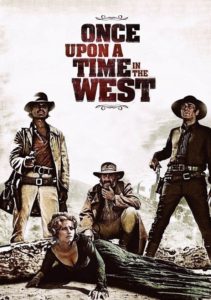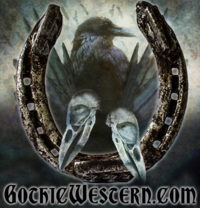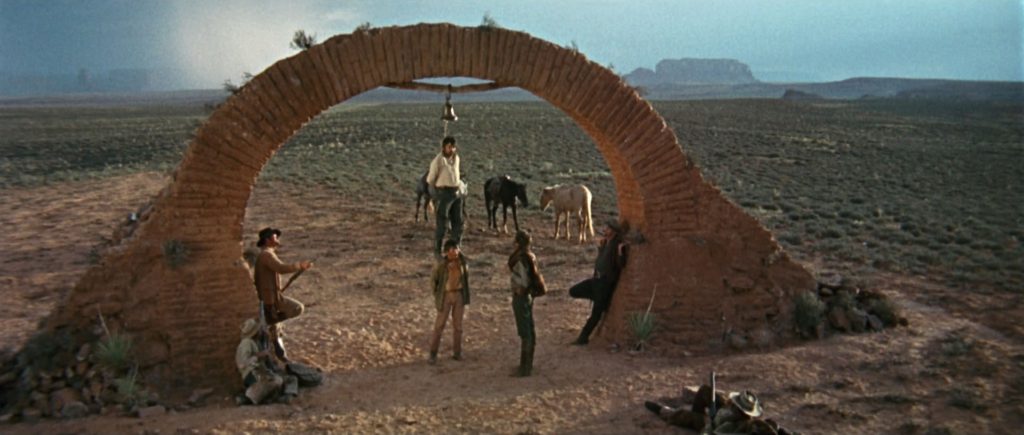After making his American Civil War epic The Good, the Bad and the Ugly, Leone had intended to retire from making Westerns, believing he had said all he wanted to say. He had come across the novel The Hoods by the pseudonymous “Harry Grey”, an autobiographical book based on the author’s  own experiences as a Jewish hood during Prohibition, and planned to adapt it into a film (this would eventually, seventeen years later, become his final film, Once Upon a Time in America). Leone though was offered only Westerns by the Hollywood studios. United Artists (who had produced the Dollars Trilogy) offered him the opportunity to make a film starring Charlton Heston, Kirk Douglas and Rock Hudson, but Leone refused. However, when Paramount offered Leone a generous budget along with access to Henry Fonda—his favorite actor, and one whom he had wanted to work with for virtually all of his career—Leone accepted the offer. He then proceeded on a journey to create this dark Spaghetti Western
own experiences as a Jewish hood during Prohibition, and planned to adapt it into a film (this would eventually, seventeen years later, become his final film, Once Upon a Time in America). Leone though was offered only Westerns by the Hollywood studios. United Artists (who had produced the Dollars Trilogy) offered him the opportunity to make a film starring Charlton Heston, Kirk Douglas and Rock Hudson, but Leone refused. However, when Paramount offered Leone a generous budget along with access to Henry Fonda—his favorite actor, and one whom he had wanted to work with for virtually all of his career—Leone accepted the offer. He then proceeded on a journey to create this dark Spaghetti Western
Leone commissioned Bernardo Bertolucci and Dario Argento—both of whom were film critics before becoming directors—to help him develop the film in late 1966. The men spent much of the following year watching and discussing numerous classic Westerns such as High Noon, The Iron Horse, The Comancheros, and The Searchers at Leone’s house, and constructed a story made up almost entirely of “references” to American Westerns.
Ever since The Good, the Bad and the Ugly, which originally ran for three hours, Leone’s films were usually cut (often quite dramatically) for box office release. Leone was very conscious of the length of Once Upon a Time in the West during filming and later commissioned Sergio Donati, who had worked on several of Leone’s other films, to help him refine the screenplay, largely to curb the length of the film towards the end of production. Many of the film’s most memorable lines of dialogue came from Donati, or from the film’s English dialogue adapter, expatriate American actor Mickey Knox.
Leone originally offered the role of Harmonica to Clint Eastwood; when he turned it down, Leone hired Charles Bronson who had originally been offered and turned down the part of the Man with No Name in A Fistful of Dollars. James Coburn was also approached for Harmonica, but demanded too much money. Actor Al Mulock (featured as Knuckles in the opening train sequence, as well as in Leone’s The Good, the Bad and the Ugly) committed suicide during shooting of the film by leaping from his Guadix hotel room in full costume. Frank Wolff, the actor who plays McBain, also committed suicide in a Rome hotel in 1971.
The music was written by composer Ennio Morricone, Leone’s regular collaborator, who wrote the score under Leone’s direction before filming began. As in The Good, the Bad and the Ugly, the haunting music contributes to the film’s grandeur and, like the music for The Good, the Bad and the Ugly, is considered one of Morricone’s greatest compositions.
American and British critics described this dark Spaghetti Western as a drawn out disaster. The French who back in the sixties were wearing Marxist T shirts thought differently. The film was a big hit in Paris and played at one cinema to ‘revolutionary students’ for nearly four years. The critics relented and ordinary cinemagoers were soon persuaded that the film had merit.




